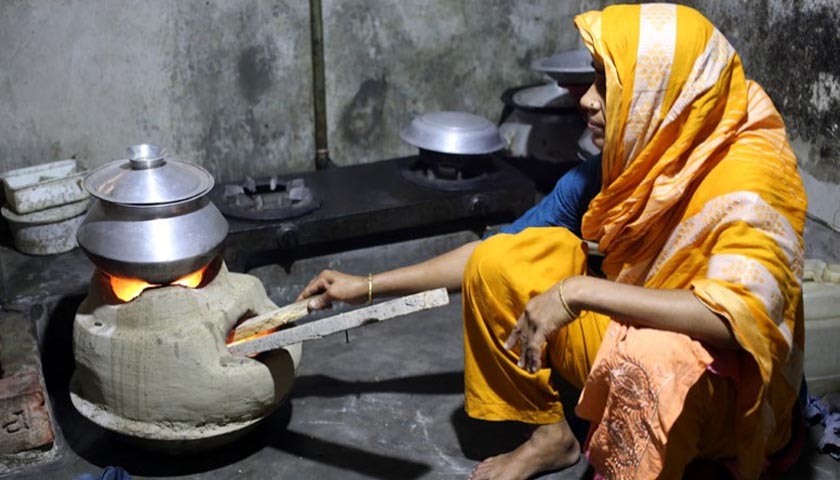An acute gas crisis has taken hold of the lives of millions of people as gas supply further dropped over the past week, with Bangladesh reeling from a prolonged dollar crisis limiting its energy imports.
The gas crisis usually worsens during the winter in normal times, but this year it turned acute over a month before winter is expected to set in.
Over four million consumers who depend on piped gas for cooking are at the heart of the crisis, mostly in Dhaka, while hundreds of thousands of others rely on CNG-run three-wheelers for their commutes.
In many areas of Dhaka, piped gas for cooking is unavailable almost throughout the daytime, leaving city residents in constant battle to adjust their routine so that they can prepare meals when they get gas in the pipeline.
‘It’s not easy preparing a day’s meals for an entire family by 7:00am,’ said Farhana Rahman, a homemaker in Gandaria, Dhaka.
Farhana wakes up early in the morning to prepare tiffin for her two sons, breakfast for the entire family, and then lunch.
She, however, is still lucky to own her kitchen.
Hundreds of thousands of low-income families living in Bangladesh’s sprawling shanties share a common kitchen, taking their turn to cook.
These families bear the brunt of the crisis, for they can neither cook properly at home nor afford takeaway foods, particularly after food prices skyrocketed following the worst inflation in more than a decade.

Many families, as shown in government and independent studies, had already cut off protein and even eggs from their menus because of their high prices.
Now the city poor stay awake almost all night waiting for their turn to cook and then work the entire day. Those who fail to adapt to the new routine stay hungry or eat half-cooked food, risking their health.
‘It seems the government is making sure that we starve to death,’ said Hamida Khatun, a resident of Badda.
Working women are particularly under a lot of stress due to the gas crisis, for they can now sleep far less than they require staying healthy.
The timing of the gas crisis in city households might vary depending on locations, but generally, the crisis stays between 7:00am and 5:00pm every day.
In some areas in the city such as Badda and Azimpur, gas crisis between 9:00am and 2:00 am persisted throughout the year.
Other areas where residents faced gas crisis included Hatirpool, Paschim Rajabazar, Mirpur, Mohammadpur, and Kalabagan.
The disruption in the piped gas supply is an injustice to households paying a monthly fixed gas bill, consumers said.
The gas bill is calculated assuming that a double burner user consumes 66 cubic metres a month while a single burner burns 55 cubic metres, according to a Bangladesh Energy Regulatory Commission order passed in June 2022.
A double burner user currently pays Tk 1,080, while a single burner user pays Tk 990 a month. The BERC, however, said that domestic gas consumers do not use more than 40 cubic metres.
‘We pay far more than what we get. This is unacceptable,’ said Shamim Akhter, a resident of Hatirpool.
In the 24 hours until 8:00am on Wednesday, the daily gas report by Petrobangla showed that gas supply stood at 2,804 mmcfd against the state-owned gas company’s capacity to supply 3,760mmcfd.
A credible estimate of gas demand is unavailable. The official estimate is regarded as an underestimation of actual demand.
Households roughly account for 13 per cent of daily gas consumption, while industries consume 19 per cent and power plants 57 per cent.
Commercial entities account for one per cent of supplied gas, followed by four per cent consumed by CNG stations and six per cent by fertiliser factories.
The gas supply in the national grid dropped by 300 mmcfd, or a 10th of the 3,094 mmcfd supply made on October 9. The drop in supply is because of the drop in liquefied natural gas supply, which is imported.
On October 9, LNG supply stood at 952 mmcfd, which dropped to 701 mmcfd on October 18.
‘We cannot afford to get energy as much as we want. We are not living in Western countries,’ said Kamruzzaman Khan, director, of operations and mines, Petrobangla.
‘Where will we get the money to get energy as much as we need?’ he asked.
He even invoked the old argument justifying the gas shortfall saying that they reduce gas supply during winter when electricity demand falls following a reduction in electricity demand for cooling.
But winter has not yet arrived, with the daytime temperature staying above 30C. Power shortage also persisted throughout Bangladesh, including Dhaka.
Bangladesh cannot use even 50 per cent of the over 24,000MW installed capacity without interruption largely because of the energy crisis.
About half of the electricity Bangladesh can produce comes from gas.
Domestic gas fields meet three-fourths of Bangladesh’s gas demand, with imports meeting the rest. The spot market accounts for six per cent of the imported gas.
After LNG import began in 2018, a Centre for Policy Dialogue estimate said, Tk 44,991 crore was spent to import it until 2021.
This year Bangladesh has imported LNG worth about Tk 10,000 crore. The government has approved procuring three more cargoes, each containing 33.6 lakh mmbtu, from the spot market this year.
It, however, is not certain if imports will be made. CNG driver Jahangir Alam spent almost two hours in a long queue at a CNG station in Mohakhali on Tuesday night to refill gas.
CNG filling stations have been slapped with gas rationing for four hours or more for about two years.
‘The government is not at all concerned about the public. The government only cares about industries. The public is considered when there is a surplus of things,’ Farhan Noor, general secretary of CNG Filling Station Owners’ Association, said.source: newage



